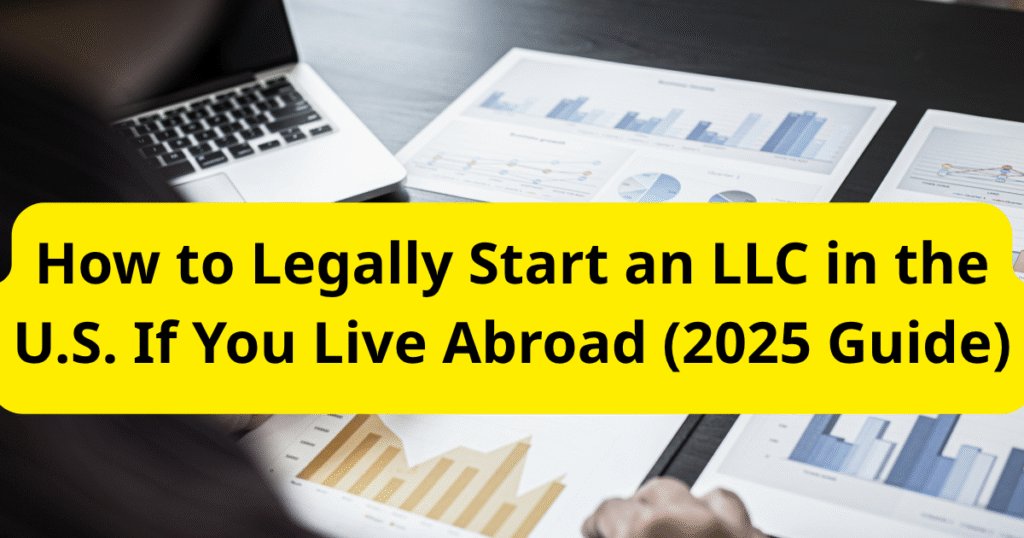Starting a Limited Liability Company (LLC) in the United States is not restricted to U.S. citizens or residents. In fact, foreign nationals from around the world—India, Morocco, Canada, Nigeria, Sweden, Brazil, and beyond—form U.S. LLCs every day to access the American market, global payment platforms, and legal business infrastructure. However, forming an LLC as a non-resident comes with specific legal rules, forms, and compliance requirements. This 2025 guide walks you through everything you need to know about the legal side of forming an LLC in the U.S. if you live abroad.

Is It Legal for a Foreigner to Start a U.S. LLC?
Yes. U.S. law permits anyone, including foreign individuals and companies, to form an LLC. You do not need to be a U.S. citizen, have a Social Security Number (SSN), or be physically present in the U.S. to start or own an LLC. According to the U.S. Small Business Administration (SBA), there are no residency or citizenship restrictions for LLC formation.
🔗 Small Business Administration – Types of Businesses
Legal Requirements for Foreign Entrepreneurs
To legally establish a U.S. LLC from abroad, you must meet a few requirements:
1. Choose a State for Your LLC
Each state has its own laws, fees, and tax requirements. Popular states among non-residents include:
- Delaware: Business-friendly, quick setup
- Wyoming: Low fees, strong privacy protections
- New Mexico: No annual reporting
- Florida: Easy market access and fast EIN processing
Before deciding, review each state’s tax treatment and ongoing obligations.
2. Appoint a Registered Agent
All LLCs in the U.S. are legally required to appoint a registered agent with a physical address in the state of formation. The agent receives legal documents on your behalf and must be available during business hours.
3. File Articles of Organization
The foundational legal document that forms your LLC is the Articles of Organization. You’ll file this with the Secretary of State of your chosen state. This document includes your LLC name, registered agent information, and management structure.
4. Apply for an EIN (Employer Identification Number)
The EIN is your LLC’s tax ID. It’s required to open a U.S. bank account, hire employees, and file federal taxes. Foreigners can obtain an EIN by submitting IRS Form SS-4, even without a Social Security Number.
🔗 IRS – Apply for an EIN (Form SS-4)
5. Create an Operating Agreement
Although not required in all states, an operating agreement defines how your LLC operates and is highly recommended to establish clarity and legal separation between you and your business.
6. Comply with U.S. Tax Regulations
Even if you do not live in the U.S., your LLC may still be subject to federal taxes, and you are required to submit informational returns if your LLC is foreign-owned. Specifically, foreign single-member LLCs must file Form 5472 and Form 1120 annually.
🔗 IRS – Form 5472 Instructions
Tax Tip: Many foreign-owned LLCs choose to be taxed as disregarded entities, meaning profits pass through to the owner. However, depending on your country’s tax treaty with the U.S., other options like electing S-Corp or C-Corp status might be more beneficial.
What You Don’t Need
You do not need the following to legally form a U.S. LLC:
- U.S. citizenship or permanent residency
- A U.S. address (your registered agent provides one)
- A visa or green card
- A U.S. partner
How Long Does It Take?
- LLC formation: 1–7 business days (varies by state)
- EIN issuance: 10–15 business days for foreign applicants
- Bank account setup: Instant (with some online banks) or 1–2 weeks with traditional banks
Can You Open a U.S. Bank Account as a Non-Resident?
Yes, and it’s a key part of compliance and functionality for your LLC. Online platforms like Mercury, Relay, and Wise allow international founders to open U.S. business bank accounts remotely, provided you have an EIN and legal LLC documents.
Banking Note: Some traditional U.S. banks require in-person visits, so many foreign founders prefer digital-first banking solutions like:
What About U.S. Visas or Immigration Status?
Forming an LLC does not grant you a visa, work permit, or legal status in the U.S. However, it can support future visa applications, like the E-2 investor visa, if you plan to move and operate your business from within the U.S.
Tips to Stay Compliant
- File an annual report if required by your state
- Maintain accurate accounting records
- File required IRS tax forms for foreign-owned LLCs
- Renew your registered agent annually
- Use a U.S.-based address for mail forwarding and compliance
Should You Use an LLC Formation Service?
To avoid mistakes and delays, many foreign entrepreneurs use services like:
- Firstbase.io – Complete formation + EIN + bank setup
- Doola – Tailored for non-U.S. residents
- ZenBusiness – Great budget option
- Northwest Registered Agent
These platforms streamline the process and handle compliance documentation, saving time and legal hassle.
Final Thoughts
Creating an LLC in the U.S. while living abroad is 100% legal and surprisingly simple if you follow the rules. With the right registered agent, proper state selection, and EIN setup, you can run a compliant U.S. business from anywhere in the world. From accepting payments through Stripe to selling on Amazon, a U.S. LLC opens the door to serious international growth.
Need help choosing the best state, filing EIN forms, or opening your business bank account? Just let me know—I’d be happy to walk you through every step and even create a personalized checklist for your situation.